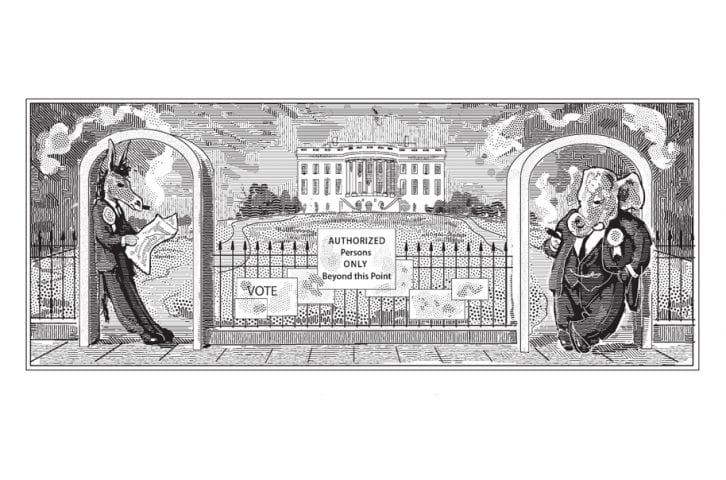Books Reviewed
A review of The Post-American World , by Fareed Zakaria
, by Fareed Zakaria
Born in India of prominent professional parents, his father a moderate Muslim active in India's dominant Congress Party, Fareed Zakaria came to America to attend Yale and then Harvard. Not long out of school, as a young managing editor of Foreign Affairs, he began to make his mark. In 1997, he punctured irrational exuberance about post-Cold War democratization by pointing out that many nascent republics were in fact "illiberal democracies." They might hold elections but, he warned, they did not respect individual rights. The next year he published From Wealth to Power, a chronicle of America's rise to global prominence as an economic and geopolitical power.
Within weeks of 9/11, Zakaria, by then editor of Newsweek's international edition, asked in an influential essay "Why Do They Hate Us?" and answered that Islamist rage sprang from civilizational humiliation and blocked reformism in the Muslim world. In 2003, he published The Future of Freedom, an expanded version of his "Illiberal Democracy" article, in which he elaborated his concern that democracy had deep institutional and cultural prerequisites that too many of its newest converts lacked. And as a further example of intellectual courage, Zakaria has eloquently spoken up for capitalism: "It creates a body of people independent from the state power. People like to talk about civil society, and that is great, but what you need is something that can stand up to organized state authority. The only things that have been able to do that are the Church and capitalism."
These sentiments make him an unusual and important public intellectual. One suspects that Nehruvian socialism and Third World-ist grievance-collecting would have come easy to a young Muslim coming of age in a Congress Party household in Bombay in the 1970s and '80s. Yale and Harvard would have been kind to such fashionable orthodoxies. But to his immense credit, Zakaria defied the fashionable bromides of the previous half-century and expressed to his readers the vaguely conservative insights that America has generally been a force for good in the world, and that the spread of markets has lifted hundreds of millions out of poverty.
* * *
Alas, his latest volume reveals that Zakaria has been seduced after all. The glittering panels of Davos may have proven irresistible to him. The Post-American World's central theme is that America's relative power is ebbing in the face of advances by other countries. China's tenacious growth and massive scale make it the most conspicuous component of the "rise of the rest." Oil exporters are also amassing vast wealth, middle classes are forming worldwide, and billionaires and skyscrapers are popping up all over. All these changes stem from globalization and liberalization, forces that America has long championed. America can and should adjust intelligently to its new situation, however, because the U.S. still has a lot going for it, starting with its cultural magnetism and the world's best system of higher education (though K-12 could use a lot of work). Its leaders would be wise to be less arrogant and to pay-and be seen paying—a decent respect to the opinions of mankind.
What's strange about these claims is that there is nothing strange about them at all. There is not a sentiment in the preceding paragraph that you haven't read dozens of times already somewhere else: they form the conventional wisdom of the West's media and its diplomatic and international business communities. Predictions of a decline in America's relative power have been commonplace for over 30 years, since well before Paul Kennedy's 1987 best-seller, The Rise and Fall of the Great Powers. More recently a similar warning has been sounded by Zbigniew Brzezinski, Charles Kupchan, and others. Granted, The Post-American World's reception has been affected by its warmed-over character. Although many reviews have been fawning, a few note that, as The Economist put it gingerly, Zakaria "might have paused more often to pay tribute to those who originated many of his ideas." In the kid-gloved world of international punditry, those are harsh words.
But the problem is not merely that Zakaria's new book is telling us what we've already heard. Like all conventional wisdom, there is less to it than meets the eye. No doubt economic gains are changing the world, endowing many states with wealth today and power tomorrow. But extrapolation is a risky business. OPEC budget surpluses have come-and gone-before. Japan, Inc.'s much-advertised takeover of the world stalled and ushered in a decade of stagnation. China's current breathtaking growth might last for decades—or, just as plausibly, might descend into the same morass of corruption and rent-seeking that plagues most developing economies.
The trends that Zakaria and so many others notice are real. But an even more interesting trend is how many extrapolations of recent trends have proven wrong. If only conventional wisdom could reflect that insight.



